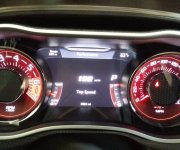Ron Beaufort
Lifetime Supporting Member
the problem with cars which are designed to automatically be "safe" is that they won't go fast enough to satisfy today's people ...
during a period of gasoline shortages (about 1972 if I recall) the maximum legal speed on the interstate highways was lowered to 55 MPH ... the statistics for accidents and deaths went drastically down ...
people went nuts and insisted that the speed limits be raised again ... the deadly statics went back up again too ...
all of those little clutches of plastic flowers and crosses that we see placed by the roadside represent hearts that have been broken - and families that have been destroyed ... it's entirely too easy to speed right on by - and assume that it always happens to "someone else" ...
sorry for the "dreary" thoughts - but when you get to be 71 years old, the world becomes a darker place ... (is that what they call "wisdom"?)
be careful out there folks ... you owe it to the ones you love - and to the ones who love you ...
during a period of gasoline shortages (about 1972 if I recall) the maximum legal speed on the interstate highways was lowered to 55 MPH ... the statistics for accidents and deaths went drastically down ...
people went nuts and insisted that the speed limits be raised again ... the deadly statics went back up again too ...
all of those little clutches of plastic flowers and crosses that we see placed by the roadside represent hearts that have been broken - and families that have been destroyed ... it's entirely too easy to speed right on by - and assume that it always happens to "someone else" ...
sorry for the "dreary" thoughts - but when you get to be 71 years old, the world becomes a darker place ... (is that what they call "wisdom"?)
be careful out there folks ... you owe it to the ones you love - and to the ones who love you ...
Last edited:





